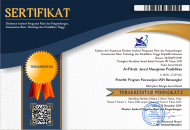Mathematics Learning for Slow Learners at Regular Schools
Abstract
Slow learners or also known as slow learners have unique characteristics. One of them is that slow learners have low memory and concentration. Mathematics teachers’ understanding of slow learners in regular schools needs to be considered so that slow learners achieve the same goals as regular students in learning mathematics. In general, this study aims to describe and analyze how the process of learning mathematics in slow learners in regular schools. This study uses a qualitative approach. Data collection techniques using interviews. The main data used in this study is primary data. The data in this study are the results of unstructured interviews with the required informants. Based on the results of the analysis obtained (1) the importance of teachers and parents in overcoming problems in slow learners, (2) the strategy or approach used by the teacher is one of the supporting factors for the success of slow learners in the mathematics learning process, (3) teachers in regular schools have several obstacles in the mathematics learning process such as not being too familiar with implementing inclusive education in regular schools, (4) regular schools recommending the parents of the students concerned to transfer slow learners to inclusive schools so that slow learners get more special attention in learning, especially mathematics learning
Keywords
Full Text:
PDFReferences
Aguilar, F. T. (2018). 3D Architectural recreation as a tool for the dissemination and education of heritage: The Palace of Pedro I in the Royal Alcázars of Seville. Boletin de Arte, 28, 537–553. https://doi.org/10.24310/BOLARTE.2007.V0I28.4497
Ahmed, Z. I., Sinha, N., Phadikar, S., & Ghaderpour, E. (2022). Automated Feature Extraction on AsMap for Emotion Classification Using EEG. Sensors (Basel, Switzerland), 22(6), 2346. https://doi.org/10.3390/s22062346
Ahmed, Z., Nathaniel, S. P., & Shahbaz, M. (2021). The criticality of information and communication technology and human capital in environmental sustainability: Evidence from Latin American and Caribbean countries. Journal of Cleaner Production, 286, 125529. https://doi.org/10.1016/j.jclepro.2020.125529
Alan, M., Pik, X., & Tania, A. (2023). Utilizing Social Media as a Means of Memorizing the Qur’an. Journal Neosantara Hybrid Learning, 1(1), 13–24. https://doi.org/10.55849/jnhl.v1i1.81
Alaofi, S. (2020). The Impact of English Language on Non-Native English Speaking Students’ Performance in Programming Class. Proceedings of the 2020 ACM Conference on Innovation and Technology in Computer Science Education, 585–586. https://doi.org/10.1145/3341525.3394008
Anderson, C. (2010). Presenting and evaluating qualitative research. American Journal of Pharmaceutical Education, 74(8). https://doi.org/10.5688/aj7408141
Bansal, P. (2011). From the editors the coming of age for qualitative research: Embracing the diversity of qualitative methods. Academy of Management Journal, 54(2), 233–237. https://doi.org/10.5465/AMJ.2011.60262792
Barakabitze, A. A. (2019). Transforming African Education Systems in Science, Technology, Engineering, and Mathematics (STEM) Using ICTs: Challenges and Opportunities. Education Research International, 2019(Query date: 2022-06-03 19:27:43). https://doi.org/10.1155/2019/6946809
Bluhm, D. J. (2011). Qualitative research in management: A decade of progress. Journal of Management Studies, 48(8), 1866–1891. https://doi.org/10.1111/j.1467-6486.2010.00972.x
Brunel, B., Martin, J., & Fang, W. (2023). Increase Elementary School Students’ Interest in Learning During Covid-19 with Teaching Materials Using E-Books. Lingeduca: Journal of Language and Education Studies, 1(2), 65–81. https://doi.org/10.55849/lingeduca.v1i2.47
Cadena, P. R. G., Qian, Y., Wang, C., & Yang, M. (2021). SPADE-E2VID: Spatially-Adaptive Denormalization for Event-Based Video Reconstruction. IEEE Transactions on Image Processing, 30, 2488–2500. https://doi.org/10.1109/tip.2021.3052070
Candela, P. P. (2022). Adaptation of the Attitude Behavioural Scale section of a PATT instrument for the Omani context. International Journal of Technology and Design Education, 32(3), 1605–1627. https://doi.org/10.1007/s10798-021-09665-7
Chew, M., Murat, R., & Justine, K. (2023). Tahfidz Al-Quran Learning Methods With Superior Class Programs. Journal Neosantara Hybrid Learning, 1(1), 37–53. https://doi.org/10.55849/jnhl.v1i1.83
Chew, M., Spurdle, T., & Mathieu, P. (2023). Arabic Teacher Creativity Survey during the Pandemic Period in Elementary Schools. Lingeduca: Journal of Language and Education Studies, 1(2), 82–94. https://doi.org/10.55849/lingeduca.v1i2.60
Grooby, E., Sitaula, C., Chang Kwok, T., Sharkey, D., Marzbanrad, F., & Malhotra, A. (2023). Artificial intelligence-driven wearable technologies for neonatal cardiorespiratory monitoring: Part 1 wearable technology. Pediatric Research, 1–13. https://doi.org/10.1038/s41390-022-02416-x
Handayani, U., & Laily, N. (2017). The Influence of Consciousness, Tax Penalty and the Quality of Tax Authorities Service on Tax Complience (Survey on Taxpayer of Boarding House in Lowokwaru District). Journal of Accounting and Business Education, 1(2), 286. https://doi.org/10.26675/jabe.v1i2.8493
Hartini, A., Widyaningtyas, D., & Mashluhah, M. I. (2017). Learning Strategies For Slow Learners Using The Project Based Learning Model In Primary School. JPI (Jurnal Pendidikan Inklusi), 1(1), 29. https://doi.org/10.26740/inklusi.v1n1.p29-39
Liam, L., Hui, H., & Carsten, L. (2023). Utilization of ICT in Learning the History of Islamic Culture. Scientechno: Journal of Science and Technology, 2(1), 64–79. https://doi.org/10.55849/scientechno.v2i1.49
Martin, J., Fang, W., & Brunel, B. (2023). Analysis of Effectiveness in Distance Learning in Tahfidz Lessons. Journal Neosantara Hybrid Learning, 1(1), 1–12. https://doi.org/10.55849/jnhl.v1i1.80
Nurpiena, S. A., Wihidayat, E. S., & Budianto, A. (2021). Developing Indonesia Sign Language (BISINDO) Application with Android Based for Learning Sign Language. Journal of Informatics and Vocational Education, 4(1). https://doi.org/10.20961/joive.v4i1.48629
Putri, N. A., Kamaluddin, K., & Amrina, A. (2023). TikTok Application on Achievement and Learning Motivation at Influence Colleges. Scientechno: Journal of Science and Technology, 2(1), 80–96. https://doi.org/10.55849/scientechno.v2i1.62
Putri Sepdikasari Dirgantoro, K. (2018). Pendekatan Keterampilan Metakognitif Dalam Pembelajaran Matematika. M A T H L I N E : Jurnal Matematika dan Pendidikan Matematika, 3(1), 1–10. https://doi.org/10.31943/mathline.v3i1.78
Supriyani, W., Karma, I. N., & Khair, B. N. (2022). Analisis Strategi Pembelajaran Bagi Siswa Lamban Belajar (Slow Learner) di SDN Tojong-Ojong Tahun Ajaran 2021/2022. Jurnal Ilmiah Profesi Pendidikan, 7(3b), 1444–1452. https://doi.org/10.29303/jipp.v7i3b.781
Tania, A., Alan, M., & Pik, X. (2023). Learning Methods Used by Arabic Language Teachers during the New Normal Period of COVID-19. Lingeduca: Journal of Language and Education Studies, 1(2), 35–49. https://doi.org/10.55849/lingeduca.v1i2.44
Vicky, D., Adrianna, H., & Phan, B. (2023). Use of Gadgets by Early Childhood in the Digital Age to Increase Learning Interest. Scientechno: Journal of Science and Technology, 2(1), 17–34. https://doi.org/10.55849/scientechno.v2i1.58
DOI: http://dx.doi.org/10.31958/jaf.v11i1.6767
Refbacks
- There are currently no refbacks.
Copyright (c) 2023 Woro Anglia Banda Sutomo, Tatang Herman

This work is licensed under a Creative Commons Attribution-NonCommercial 4.0 International License.
__________________________________________________________________________
 | Al-Fikrah: The Journal of Educational Management |
Creations are disseminated below Lisensi Creative Commons Atribusi-NonKomersial 4.0 Internasional.













